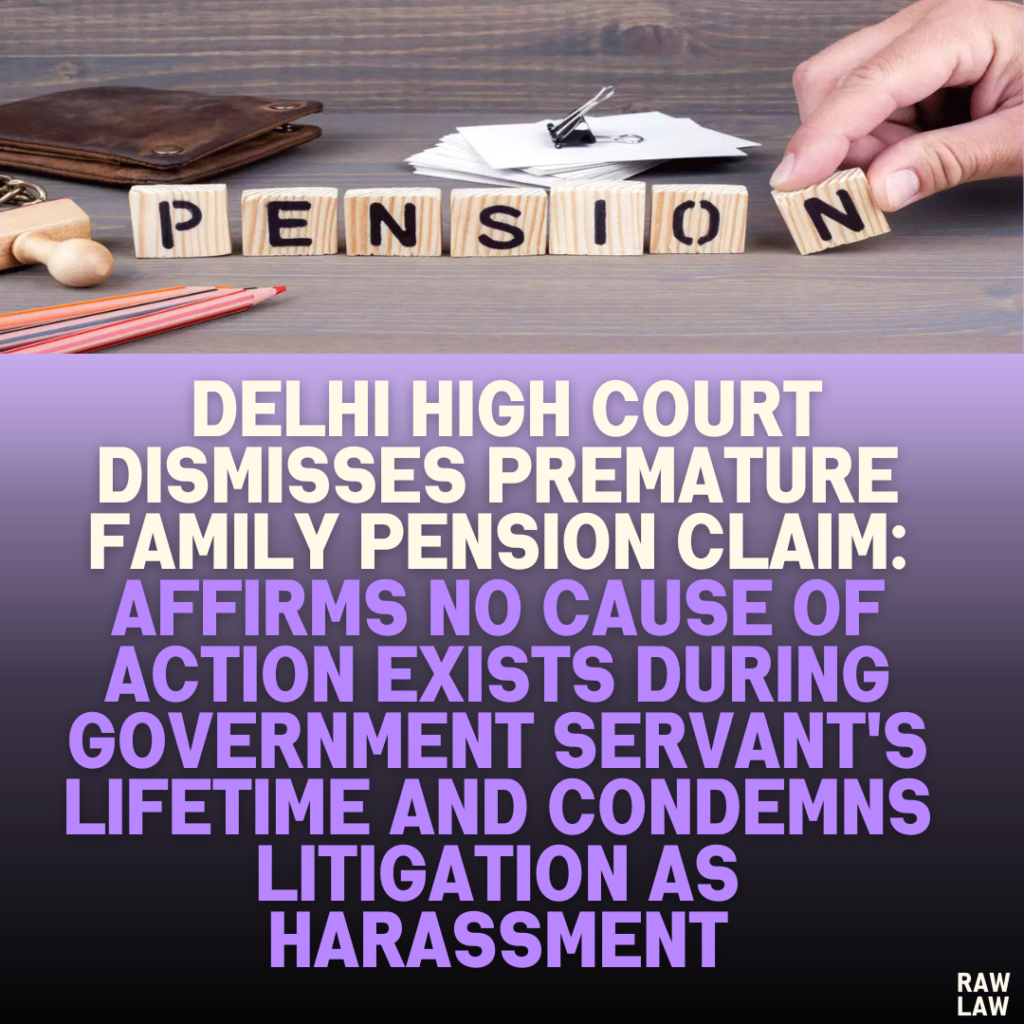Court’s Decision
The Delhi High Court allowed the revision petition under Section 115 of the Code of Civil Procedure, 1908 (CPC), filed by the petitioner (wife). It set aside the trial court’s order dismissing her application under Order VII Rule 11 CPC and rejected the suit filed by the respondent (husband). The court held that the plaintiff’s claim for a family pension was premature and lacked any valid cause of action since family pension rights accrue only upon the death of the government servant.
Facts
- Background:
- The petitioner (wife) was employed as a teacher in the Department of Education, Delhi, before her marriage in 1990 and retired in 2018.
- The respondent (husband), a retired government servant, alleged that the petitioner intentionally concealed her marital status in her service records to deprive him of his family pension entitlement.
- Matrimonial Disputes:
- The couple experienced marital discord, leading to separation in 2008. The custody of their two children was granted to the petitioner.
- Despite an attempt at reconciliation in 2012, their relationship remained strained.
- Plaintiff’s Allegations:
- The respondent alleged that the petitioner falsely declared herself as unmarried in her service records, thereby excluding his and their children’s names, which could impact their future claims to family pension.
- He sought directives for the immediate rectification of her service records and to expedite the processing of his family pension.
- Defendant’s Response:
- The petitioner contended that any omission in her marital status in the service records was inadvertent and corrected once it came to her attention.
- She argued that the suit was filed to harass her, citing numerous complaints made by the respondent that delayed her pension disbursal.
Issues
- Whether the suit disclosed any cause of action when the petitioner was alive and receiving her pension.
- Whether the alleged inaccuracies in service records affected the respondent’s entitlement to family pension under the Central Civil Services (Pension) Rules.
Petitioner’s Arguments
- The petitioner argued that:
- Family pension rights arise only after the death of the government servant, making the respondent’s claim premature.
- The respondent was already receiving his pension after retiring in 2012 and was attempting to harass her through this litigation.
- She had rectified her marital status in her service records as soon as she became aware of the discrepancies.
- The suit, therefore, lacked any present legal basis and should be dismissed under Order VII Rule 11 CPC.
Respondent’s Arguments
- The respondent contended that:
- The petitioner’s failure to update her marital status in her service records was intentional and deprived him and their children of their rightful claim to family pension.
- As the petitioner’s spouse, he had a legitimate interest in ensuring that his name was included in her pension-related documents to safeguard his entitlement.
Analysis of the Law
- Family Pension under CCS Rules:
- The court referred to Rule 50 of the CCS Pension Rules, 2021, which provides that family pension becomes payable only upon the death of the government servant.
- The rule specifies that family pension is disbursed to eligible family members, including the widow, widower, children, dependent parents, or siblings.
- Declaration in Service Records:
- The court emphasized that while service records may include details of family members, their omission does not preclude an eligible person from claiming family pension under the rules.
- Eligibility for family pension is determined at the time of application, provided the requisite qualifications are met.
- No Cause of Action:
- The court observed that the plaintiff’s claims were speculative and contingent upon the death of the petitioner, an event that may or may not occur during his lifetime.
- It reaffirmed that speculative claims do not constitute a valid cause of action under Order VII Rule 11 CPC.
Precedent Analysis
The court applied the principles of Order VII Rule 11 CPC, which requires rejection of a plaint if it fails to disclose any cause of action. The court relied on established judicial precedents emphasizing that:
- A cause of action must be present and substantive at the time of filing the suit.
- Claims based on future contingencies or speculation do not meet this threshold.
Court’s Reasoning
- The court held that the plaintiff’s claims were entirely premature:
- The petitioner was alive and receiving her pension, making the respondent’s claims for family pension legally untenable.
- Family pension is a contingent right that arises only upon the death of the pensioner.
- The court noted that:
- The petitioner had already rectified her marital status in her service records.
- The respondent was not precluded from applying for family pension should he meet the eligibility criteria when the situation arises.
- The court condemned the respondent’s actions as harassment:
- By filing baseless complaints and the current suit, the respondent created unnecessary hurdles for the petitioner in accessing her pension.
Conclusion
The court allowed the petitioner’s revision petition, setting aside the trial court’s order and dismissing the respondent’s suit. The court concluded that the plaint failed to disclose any cause of action and that the respondent’s claims were speculative and without legal foundation.
Implications
- Legal Clarity:
- The judgment reinforces the principle that family pension claims can only arise after the death of the government servant and cannot be based on speculative or contingent grounds.
- Protection Against Harassment:
- The ruling protects individuals from frivolous litigation that seeks to exploit procedural lapses or future contingencies for personal gain.



